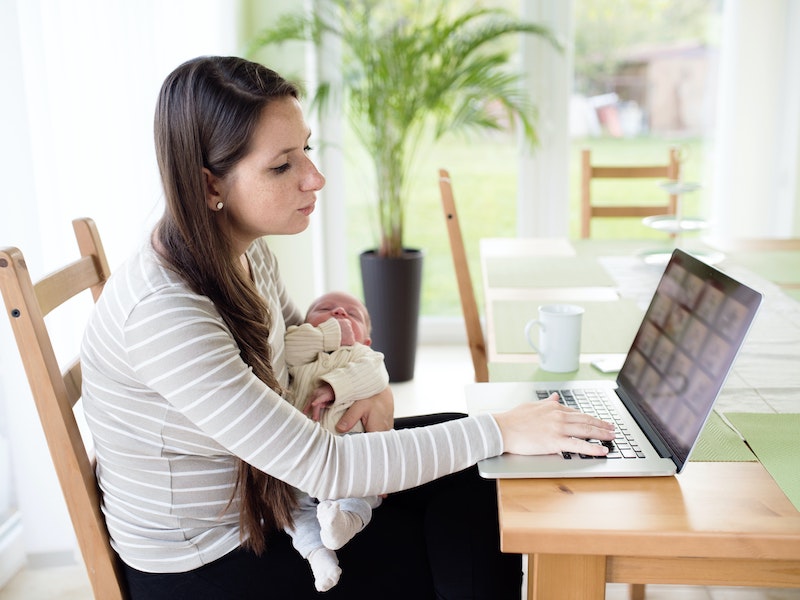New research, conducted by That Works For Me, an organisation with the aim of keeping women in the workplace, has found that despite 98% of mums wanting to go back to work after they have children, only 13% think it’s viable on a full-time basis.
The research, carried out last year, took a deep-dive into what happens to women’s careers after they have children. 848 mothers from across the UK shared their experiences of what happened to their careers after having children.
The report shows that less than a quarter (24%) of women go back to full-time after having children, and of that 24%, 79% ended up leaving anyway due to not being able to maintain a full-time role alongside having a baby. The research tells the story that most mothers already know – working full time alongside having children is impossible for most.
The cost of childcare was one of the most commonly cited reasons and of those that did try, they were often made redundant or were forced to leave their jobs because pressure led to ill mental health.
When it comes to maternity leave, the Careers After Babies report highlighted the fact that many businesses are doing the bare minimum. The legal requirement is for women to be able to return to the same job when they take less than 6 months maternity leave or to a similar job if they take more than 6 months. The research found that 71% of women in senior positions took less than 6 months off in order to try and keep their jobs, and most did so successfully. 15% of women returned to different jobs in the same company but 57% ended up leaving their organisation within 2 years, suggesting that the strategy of moving women into different roles doesn’t keep women in employment.
The report looked at 4 areas – maternity leave, returning to work, career progress and what women actually want. An interesting finding was that more than half of women stated that if childcare was available at a significantly reduced price, they would choose to work four days or more given the option. Only 2% said they would have chosen to be stay-at-home mums, versus the 11% that were actually in this position.
Shared parental leave was introduced by the UK government in 2015 in an attempt to keep more women in work, however the report found that just 7% of couples shared leave. More disappointingly, just 25% of women had the conversation with their partners about sharing leave, many stating that it wasn’t even a consideration. In some cases, this was due to men feeling as though they didn’t want to stand out at work as parental leave for men is still considered abnormal.
In terms on career progress, the report highlighted a need for change around women’s career progress after maternity leave. The research found there was a 32% reduction in women in managerial roles after starting a family, with a corresponding 44% increase of women in admin roles, with many stating that it’s easier to find flexible work opportunities at a junior level. This points to a huge loss of talent at the management level and is likely to be a largely contributing factor to the 14.9% gender pay gap which currently exists.
 Jess Heagren, author of the report and founder of That Works For Me said, “We all know that women’s careers are negatively impacted by having children – you just have to look at the gender pay gap and the pathetically low 1% of female CEO’s in FTSE250 companies. But what’s so frustrating is that mums want to work! They want to contribute at home and to the economy!
Jess Heagren, author of the report and founder of That Works For Me said, “We all know that women’s careers are negatively impacted by having children – you just have to look at the gender pay gap and the pathetically low 1% of female CEO’s in FTSE250 companies. But what’s so frustrating is that mums want to work! They want to contribute at home and to the economy!
“There are barriers whichever way they turn – full time childcare costs are unaffordable to the majority of women but businesses aren’t offering reduced hours either. Women make up 50% of the population, and 86% of women will be mothers by the age of 40. Businesses cannot ignore 43% of the population!
“This report has been downloaded thousands of times already. The fact so many women are interested in this data tells us a lot. This research gives women the empirical evidence we need been lacking to demand more from businesses when it comes to returning mums. Businesses need to do better. They need to support flexible working and focus on developing and retaining female talent. Ultimately, this diversity will benefit everyone – not just women who have children.”
DOWNLOAD THE REPORT
That Works For Me aims to keep women in the workplace on terms that work for them by educating businesses on how to hold on to them, building inclusive cultures and also connecting skilled mums with businesses requiring freelancers or with employed roles to fill. Jess Heagren is CEO and Founder and author of the Careers After Babies report. More information available here.










